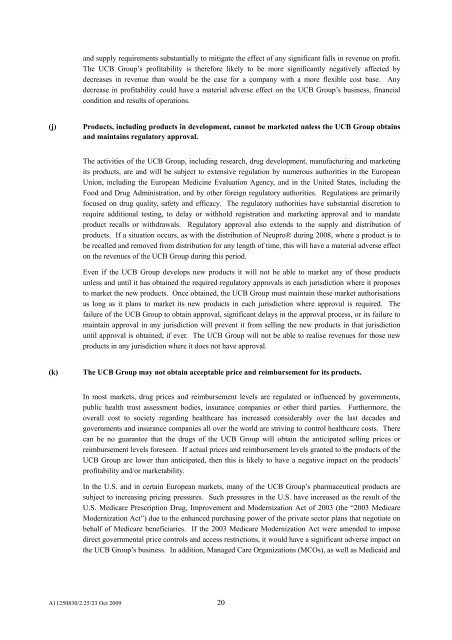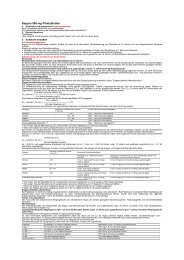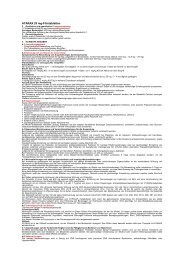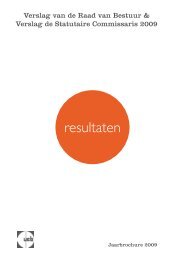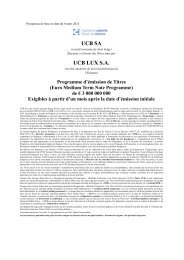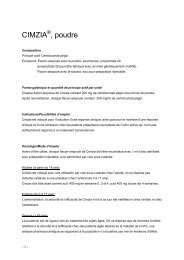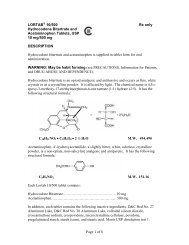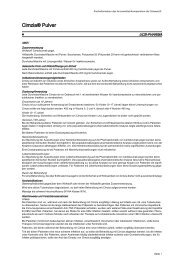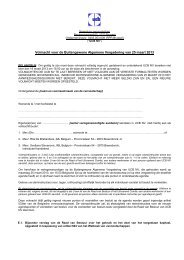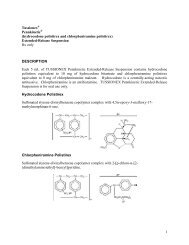UCB SA - BNP Paribas Fortis
UCB SA - BNP Paribas Fortis
UCB SA - BNP Paribas Fortis
Create successful ePaper yourself
Turn your PDF publications into a flip-book with our unique Google optimized e-Paper software.
and supply requirements substantially to mitigate the effect of any significant falls in revenue on profit.<br />
The <strong>UCB</strong> Group’s profitability is therefore likely to be more significantly negatively affected by<br />
decreases in revenue than would be the case for a company with a more flexible cost base. Any<br />
decrease in profitability could have a material adverse effect on the <strong>UCB</strong> Group’s business, financial<br />
condition and results of operations.<br />
(j) Products, including products in development, cannot be marketed unless the <strong>UCB</strong> Group obtains<br />
and maintains regulatory approval.<br />
The activities of the <strong>UCB</strong> Group, including research, drug development, manufacturing and marketing<br />
its products, are and will be subject to extensive regulation by numerous authorities in the European<br />
Union, including the European Medicine Evaluation Agency, and in the United States, including the<br />
Food and Drug Administration, and by other foreign regulatory authorities. Regulations are primarily<br />
focused on drug quality, safety and efficacy. The regulatory authorities have substantial discretion to<br />
require additional testing, to delay or withhold registration and marketing approval and to mandate<br />
product recalls or withdrawals. Regulatory approval also extends to the supply and distribution of<br />
products. If a situation occurs, as with the distribution of Neupro® during 2008, where a product is to<br />
be recalled and removed from distribution for any length of time, this will have a material adverse effect<br />
on the revenues of the <strong>UCB</strong> Group during this period.<br />
Even if the <strong>UCB</strong> Group develops new products it will not be able to market any of those products<br />
unless and until it has obtained the required regulatory approvals in each jurisdiction where it proposes<br />
to market the new products. Once obtained, the <strong>UCB</strong> Group must maintain these market authorisations<br />
as long as it plans to market its new products in each jurisdiction where approval is required. The<br />
failure of the <strong>UCB</strong> Group to obtain approval, significant delays in the approval process, or its failure to<br />
maintain approval in any jurisdiction will prevent it from selling the new products in that jurisdiction<br />
until approval is obtained, if ever. The <strong>UCB</strong> Group will not be able to realise revenues for those new<br />
products in any jurisdiction where it does not have approval.<br />
(k) The <strong>UCB</strong> Group may not obtain acceptable price and reimbursement for its products.<br />
In most markets, drug prices and reimbursement levels are regulated or influenced by governments,<br />
public health trust assessment bodies, insurance companies or other third parties. Furthermore, the<br />
overall cost to society regarding healthcare has increased considerably over the last decades and<br />
governments and insurance companies all over the world are striving to control healthcare costs. There<br />
can be no guarantee that the drugs of the <strong>UCB</strong> Group will obtain the anticipated selling prices or<br />
reimbursement levels foreseen. If actual prices and reimbursement levels granted to the products of the<br />
<strong>UCB</strong> Group are lower than anticipated, then this is likely to have a negative impact on the products’<br />
profitability and/or marketability.<br />
In the U.S. and in certain European markets, many of the <strong>UCB</strong> Group’s pharmaceutical products are<br />
subject to increasing pricing pressures. Such pressures in the U.S. have increased as the result of the<br />
U.S. Medicare Prescription Drug, Improvement and Modernization Act of 2003 (the “2003 Medicare<br />
Modernization Act”) due to the enhanced purchasing power of the private sector plans that negotiate on<br />
behalf of Medicare beneficiaries. If the 2003 Medicare Modernization Act were amended to impose<br />
direct governmental price controls and access restrictions, it would have a significant adverse impact on<br />
the <strong>UCB</strong> Group’s business. In addition, Managed Care Organizations (MCOs), as well as Medicaid and<br />
A11250830/2.25/23 Oct 2009 20


